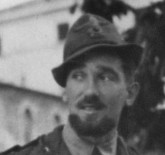Hope in Harsh Circumstances
The Sergeant in the Snow Mario Rigioni Stern
Translation Archibald Colquhoun
Like his compatriot Primo Levi, the Italian writer Mario Rigoni Stern, who has died aged 86, was the author of a much-admired bestselling memoir about his grim experiences during the Second World War. But the two men wrote from utterly different perspectives.
The book’s mesmeric story-telling and its difference from all other post-Fascist accounts of World War II instantly made it an Italian classic
The Independent
Levi, an Italian Jew, survived Auschwitz, recounting his sufferings there and on his arduous return home in If This Is a Man (1947). At first, Rigoni Stern served the Fascist state. He was a sergeant commanding a platoon in Mussolini’s army on the river Don in the Soviet Union during the last catastrophic period of defeat and retreat during the winter campaign of 1942-43.
His memoir of those dramatic last days, The Sergeant in the Snow (1953), describes how he succeeded in leading 70 survivors on foot from the Ukraine into White Russia and back to Italy. In the 60 years after its publication this work, which won him the Viareggio prize for best debut, sold more than a million copies and was translated round the world; it was first published in English in 1954. It was not written, he said, to claim a role as a hero, but as a tribute to his fellow soldiers and the ordinary Russians who gave them shelter. Like Levi he felt that ‘only by putting it down in print can I save myself from madness’. The most significant characteristic of this book is its simplicity. Despite describing the harshest of circumstances, Rigoni Stern managed to write a hopeful book.




